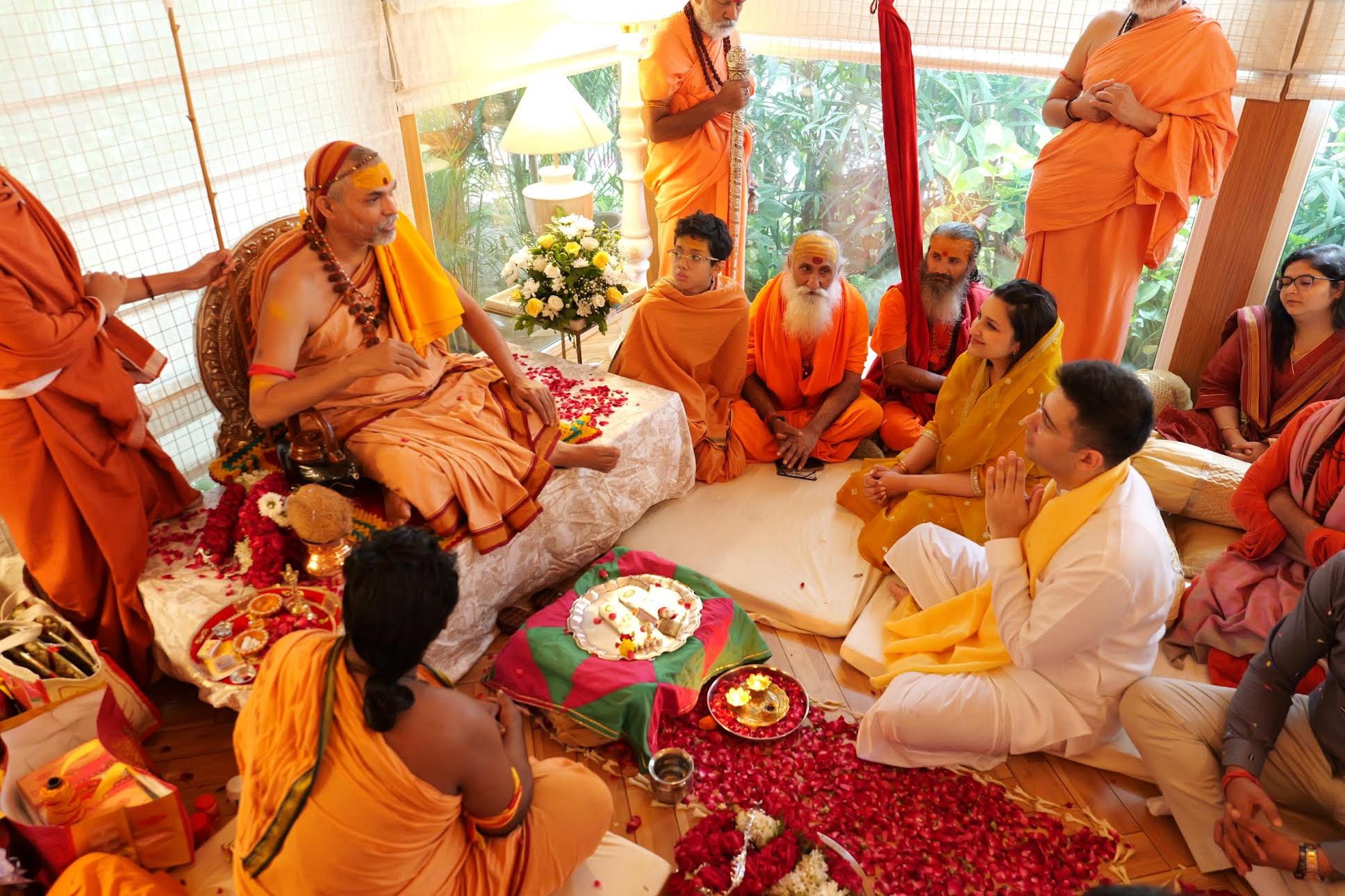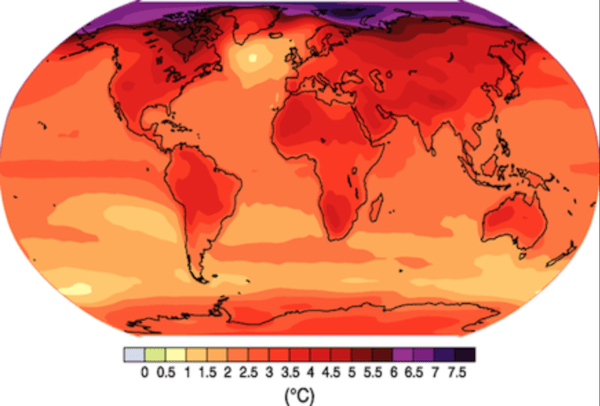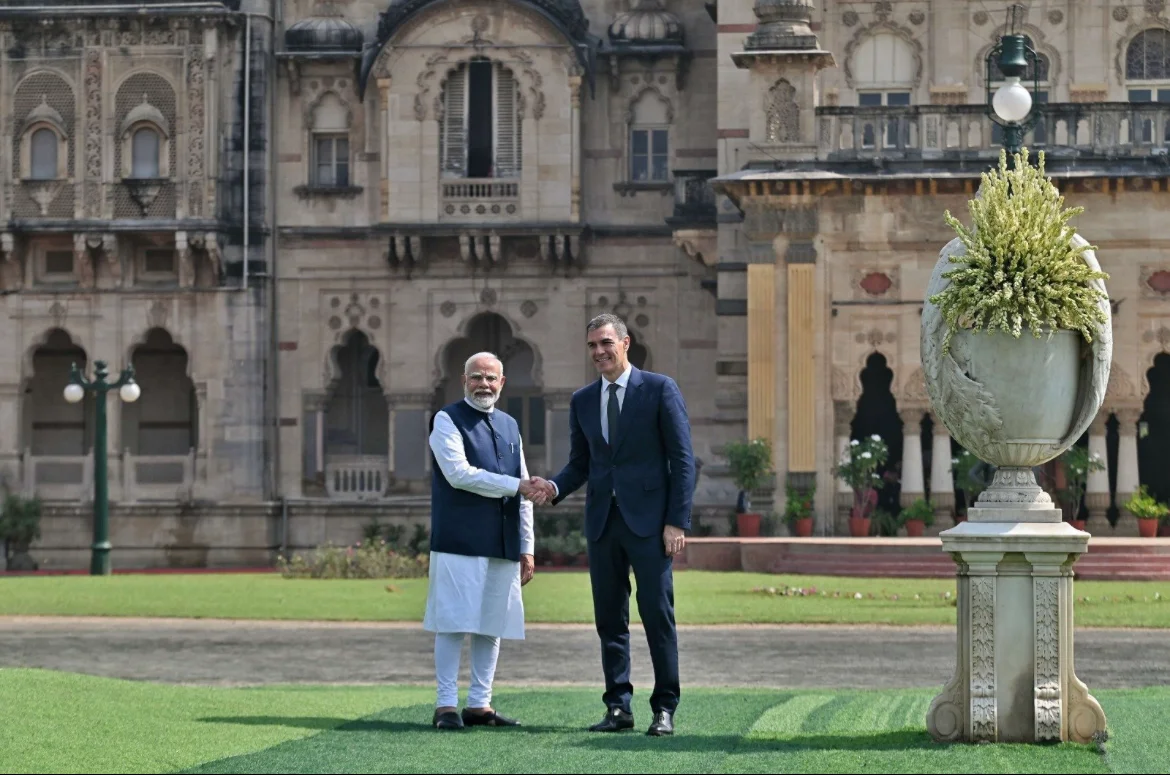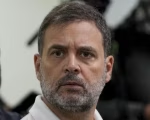At the invitation of the Prime Minister of India, Shri Narendra Modi, President of the Government of Spain, Mr. Pedro Sanchez paid an official visit to India on 28 -29 October, 2024. This was President Sanchez’s first visit to India and the first visit by a President of the Government of Spain to India after 18 years. He was accompanied by the Minister of Transport and Sustainable Mobility and the Minister of Industry and Tourism, and a high-level official and business delegation.
The two leaders noted that this visit has renewed the bilateral relationship, infusing it with fresh momentum and setting the stage for a new era of enhanced cooperation between the two countries across various sectors. They also expressed satisfaction at the progress of bilateral relations since Prime Minister Modi’s visit to Spain in 2017. Both leaders instructed their teams to continue upgrading the bilateral agenda further and forging cooperation in all dimensions of political, economic, security, defence, people-to-people and cultural cooperation.
President Sanchez was granted a cultural welcome, and held delegation level talks with Prime Minister Modi at Vadodara.He also visited Mumbai where he interacted with prominent business leaders, cultural figures and representatives of the Indian film industry.
President Sanchez and Prime Minister Modi jointly inaugurated the Final Assembly Line Plant of C-295 aircraft co-produced by Airbus Spain and Tata Advanced Systems Ltd. at Vadodara. This plant will roll out the first ‘Made in India’ C295 aircraft in 2026, out of a total of 40 aircrafts to be manufactured in India. Airbus Spain is also delivering 16 aircrafts in ‘fly-away’ condition to India, out of which 6have already been delivered to the Indian Air Force.
Political, Defence, and Security Cooperation
1. The two leaders reviewed the warm and cordial bilateral ties between the two countries and highlighted that the foundation of the growing partnership lies in the shared commitment to democracy, freedom, rule of law, a fair and equitable global economy, a more sustainable and resilient planet, a rules-based international order and enhanced and reformed multilateralism. They also highlighted the enduring historical ties and long-standing friendship between the two nations as central to this cooperation.
2. Both leaders emphasised that regular high-level interaction is giving momentum to the partnership. They noted that the ongoing bilateral cooperation between the foreign, economy and commerce and defence ministries is working well, and stressed the importance of holding regular dialogues between the concerned ministries/agencies of the two sides with a view to strengthening and diversifying bilateral cooperation in key areas of defence, security including cyber security, trade and economic issues, culture, tourism, education and people-to-people ties.
3. Both leaders expressed satisfaction on the progress made in the C-295 aircraft project as a symbol of the growing defence industrial cooperation between the two countries. In line with this growing partnership, and in recognition of the advanced capabilities and competitiveness of the Spanish defence industry and its contribution to the goals of the ‘Make in India’ initiative, they encouraged their respective defence industries in other sectors to set up similar joint projects in India.
Economic and Commercial Cooperation
4. President Sanchez and Prime Minister Modi welcomed the recent positive developments in bilateral trade and investment partnership, buoyed by the positive economic outlook in both countries and called for stronger ties between the businesses of the two countries.
5. Prime Minister Modi congratulated President Sanchez on the growth and the resilience of the Spanish economy. President Sanchez complimented Prime Minister Modi on India’s fast economic growth and lauded the various government initiatives to promote a business-friendly environment. President Sanchez highlighted Spain’s commitment to the ‘Make in India’ initiative through the activities of about 230 Spanish companies present in India. Both leaders reiterated their strong support for an open rules-based multilateral trading system, and a business-friendly investment scenario in both countries.
6. Recognizing the expertise of Spanish companies in areas such as energy, including renewables, nuclear, and smart grids, food processing, healthcare and health services, automotive and transport infrastructure, including trains, roads, ports and transport network management, the two leaders welcomed further collaboration in these areas. President Sanchez welcomed the positive contributions being made by Indian companies to the Spanish economy in fields such as information technology, pharmaceuticals and automobile and auto components. Both leaders welcomed the establishment of a ‘Fast Track Mechanism’ to facilitate mutual investments in India and Spain.
7. The two leaders took note of the progress made by the 12th session of the India-Spain ‘Joint Commission for Economic Cooperation’ (JCEC) held in 2023 and agreed to convene the next session of the JCEC in Spain in early 2025. In this context, they also agreed on the importance of deepening economic ties and exploring strategic cooperation in key sectors such as renewable energy, technology, and sustainable infrastructure. The two leaders looked forward to an early conclusion of Memorandum of Understanding on Urban Sustainable Development.
8. Both leaders welcomed the Second meeting of the India-Spain CEOs Forum as well as India-Spain Business Summit in Mumbai on October 29, 2024,to promote trade and investment cooperation between the two countries.
9. Both leaders recognized the vital importance of innovation and the startup ecosystems in driving forward the bilateral partnership and called for all such opportunities to be explored in mutual interest. They encouraged relevant agencies of both countries to work to deepen any such exchanges in the future, including through frameworks such as Rising Up in Spain and the Startup India initiative.
10. The two leaders expressed satisfaction at the signing of a Memorandum of Understanding on cooperation in the field of rail transport and the agreement of cooperation and mutual assistance in customs matter.
11. The leaders acknowledged the role of tourism in driving economic and business opportunities and enhancing understanding between the people of both countries and agreed that it should be further promoted. Both leaders welcomed the interest shown by airlines to establish direct flights between Spain and India.
The Year 2026 as India-Spain Year of Culture, Tourism and AI
12. Taking into account the deep relationship between India and Spain and the long lasting friendship between the two peoples, Prime Minister Modi, and President Pedro Sanchez, have agreed to make 2026 as the Year of India and Spain in Culture, Tourism and Artificial Intelligence (AI).
13. During the year, both sides will make the maximum effort to boost the cultural presence of the other in their museums, art, fairs, film, festivals, literature, meetings of architects and circles of debate and thought.
14. Likewise, special attention will be paid to ways of increasing tourist flows, promote reciprocal investments and share experiences in the many areas of hospitality, architecture, cuisine, marketing, both in urban and rural tourism, which benefits harmonious development and improvement for both countries.
15. In accordance with the G20 New Delhi Leaders Declaration, India and Spain can play a very important role for the use of AI for good and its positive implementation in many fields. Both countries commit to hold during the year, events to foster positive use of AI and will work for the practical implementation of new advances in the field of AI in the productive economy.
16. To mark the importance of this initiative, both leaders directed the concerned stakeholders to celebrate the year in the respective countries in the most befitting manner.
Cultural and People-to-People Ties
17. The two leaders acknowledged the role of cultural ties in bringing nations closer and lauded the rich and diverse cultural heritage of India and Spain. They appreciated the long-standing cultural exchanges and enrichment between India and Spain, particularly the role of Spanish Indologists and Indian Hispanists. They welcomed the signing of a Cultural Exchange Program to promote bilateral exchanges in music, dance, theatre, literature, museums and festivals.
18.The two leaders applauded the growing interest in the study of the cultures and languages of both countries. Spanish is among popular foreign languages in India. They stressed the mutual interest in further strengthening India – Spain cultural cooperation and the reinforcement of cooperation among cultural institutions of both countries such as Instituto Cervantes in New Delhi and Casa de la India in Valladolid.
19. The two leaders welcomed the establishment of the ICCR Chairs on Hindi and on Indian Studies at the University of Valladolid. India is bringing transformational changes in education sector in India under National Education Policy (NEP) 2020. In this context, Prime Minister Modi encouraged leading Spanish universities to strengthen academic and research partnership with Indian institutions; build institutional linkages through joint/dual degree and twinning arrangements and explore the possibility of setting up branch campuses in India.
20. President Sanchez is also giving the keynote address at the 4th Spain-India Forum, co-organized by Spain-India Council Foundation and Observer Research Foundation, in Mumbai. The leaders recognized the valuable contributions of this institution, which has a complementary role to that of governments in strengthening the links between Indian and Spanish civil societies, companies, think tanks, administrations and universities, helping to enhance bilateral ties by fostering a strong partnership between their members and its activities and bringing the two countries together in order to increase their mutual knowledge.
21. The two leaders welcomed the installation at Valladolid of the bust of Gurudev Rabindranath Tagore gifted to the people of Spain by ICCR and the placing of the translated works of Tagore in the vaults of Instituto Cervantes in Madrid which is a testament to increasing cultural connect between peoples of the two countries.
22. The two sides noted with satisfaction the growing cooperation in the field of film and audio-visuals, with India being the Guest Country at the SEMINCI International Film Festival in 2023, and the award of the IFFI Satyajit Ray Lifetime Achievement to the legendary Spanish director Carlos Saura. Acknowledging the large film and audio-visual industries in India and Spain, both leaders agreed that the scope of collaboration between the two countries under the Audio-Visual Co-Production Agreement can be enhanced and welcomed the creation of a Joint Commission to improve cooperation between the two countries in the audiovisual field and promote and facilitate the co-production of films.
23. To enhance people-to-people ties and consular services in two countries, the two leaders welcome the operationalisation of India’s first Consulate General in Spain at Barcelona and the decision to open Spain’s Consulate General in Bengaluru.
EU and India relations
24. Prime Minister Modi and President Sanchez reaffirmed their commitment to strengthening the India-EU Strategic Partnership and to advancing the EU-India triple negotiations of comprehensive Free Trade Agreement, Investment Protection Agreement and Geographical Indications Agreement.
25. They agreed to enhance their collaboration to fully realize the objectives of the EU-India Connectivity Partnership, and recognized the potential of the India-Middle East-Europe Economic Corridor Project (IMEEC) to boost connectivity between India and Europe. They explored avenues for cooperation among regional countries in areas such as trade, investment, technology, energy, logistics, ports, and infrastructure development.
Global Issues
26. The leaders expressed their deepest concern over the war in Ukraine and reiterated the need for a comprehensive, just and lasting peace in line with international law, and consistent with the purposes and principles of the UN Charter, including respect for sovereignty and territorial integrity. They underlined the importance of dialogue and diplomacy as well as earnest engagement between all stakeholders to achieve a sustainable and peaceful resolution of the conflict. Both sides agreed to remain in touch to support efforts aimed at negotiated settlement of the conflict.
27.They shared their firm commitment to achieving peace and stability in the Middle East, and expressed their deep concern at the escalation of security situation in West Asia and called for restraint by all concerned. They urged that all issues be addressed through dialogue and diplomacy. The two leaders unequivocally condemned the terror attacks on Israel on October 7, 2023, and agreed that the large-scale loss of civilian lives and the humanitarian crisis in Gaza is unacceptable and must end as soon as possible. They called for the immediaterelease of all hostages, immediate ceasefire and safe, sustained entry of humanitarian aid into Gaza. They emphasized the urgent need to protect the lives of civilians and urged all parties to comply with international law. They reiterated their commitment to the implementation of the two State solution,leading to the establishment of a sovereign, viable and independent state of Palestine, living within secure and mutually recognized borders, side by side in peace and security with Israel as well as their support for Palestine membership at the United Nations.
28. Both sides reiterated their concern on escalation and violence in Lebanon, and the security situation along the Blue Line and reaffirmed their commitment to the full implementation of UNSC Resolution 1701. As major troop contributing countries, they condemned the attacks on UNIFIL and highlighted that the safety and security of peacekeepers are of paramount importance and must be ensured by all. Inviolability of UN premises and the sanctity of their mandate must be respected by all.
29. Both sides emphasized the promotion of a free, open, inclusive, peaceful, and prosperous Indo-Pacific, anchored in a rules-based international order, mutual respect for sovereignty, and the peaceful resolution of disputes, supported by effective regional institutions. They highlighted the importance of unimpeded commerce and freedom of navigation, in compliance with international law, particularly the United Nations Convention on the Law of the Sea (UNCLOS) 1982. Both sides acknowledged India’s invitation to Spain to participate in the Indo-Pacific Oceans Initiative (IPOI) for collaborative efforts aimed at the management, conservation, sustainability, security, and development of the maritime domain in the Indo-Pacific. They also recognized the complementarity between India’s Indo-Pacific Vision and the EU Strategy for Cooperation in the Indo-Pacific.
30. Noting the growing political and commercial relations between India and Latin American region and the historical, economic and cultural links it shares with Spain, both leaders recognized the immense potential of triangular cooperation for investments and development in the region. Spain welcomed India’s application to join the Ibero-American Conference as an Associate Observer, which will offer a platform to strengthen the ties with Latin American countries. Both sides committed to finalise the process by the Ibero-American Summit, to be held in Spain in 2026, so that India may actively participate in the activities of Spain´s Pro Tempore Secretariat.
International and Multilateral Cooperation
31. Both leaders agreed to enhance cooperation and coordination within the United Nations, including the UN Security Council (UNSC), and other multilateral forums. They emphasized the importance of a rules-based international order for ensuring global peace and development. Both sides committed to advancing multilateralism that reflects present-day realities, making international organizations, including the UNSC, more representative, effective, democratic, accountable and transparent. India expressed its support for Spain’s UNSC candidature for the term 2031-32, while Spain expressed its support for India’s candidature for the period 2028-29.
32. Both leaders look forward to the Fourth International Conference on Financing for Development to take place in 2025 in Sevilla (Spain) as a critical opportunity to identify priority actions to help close the resource gap needed to implement the Sustainable Development Goals.
33. President Sanchez congratulated Prime Minister Modi on the exemplary chairmanship of G20, which successfully and inclusively addressed important and complex Global South issues. Prime Minister Modi appreciated the valuable contributions made by Spain to the discussions as a Permanent Invitee to the G20.
34. The two leaders agreed to strengthen cooperation in promoting sustainable energy and adapting to climate change. They recognize the urgency of accelerating global actions to combat climate change and commit to collaborating in the context of the upcoming Climate Summit in Baku (COP29) to achieve an ambitious outcome including on a New Collective Quantified Goal on Climate Finance that helps achieve the temperature goal of Paris Agreement. They also highlighted the need topromote actions to strengthen countries’ resilience and adaptation capacities in the face of the increasing impacts of climate change worldwide. The two leaders looked forward to the early conclusion of Memorandum of Understanding in the field of Renewable Energy. Prime Minister Modi appreciated Spain’s commitment towards a green transition and welcomed Spain to the International Solar Alliance. President Sanchez appreciated advances made by India in achieving the renewable energy goals much ahead of the target year. Both leaders also agreed that a concerted global effort would be needed in order to address climate change concerns. Both sides will respond positively to the outcomes of COP28, including the first Global Stocktake in light of national circumstances.
35. Spain has invited India to join IDRA, the International Drought Resilience Alliance, which was launched in 2022, a platform to promote concrete actions to reduce the vulnerability of countries, cities and communities to drought through preparedness and adaptation measures.
36.Both leaders unequivocally condemned terrorism and violent extremism in all its forms and manifestations, including the use of terrorist proxies and cross-border terrorism. Both sides agreed that terrorism remains a serious threat to international peace and stability, and called for bringing the perpetrators of all terrorist attacks to justice without delay. They urged all countries to take immediate, sustained and irreversible action to prevent territory under their control from being used for terrorist purposes, and stressed the need for firm implementation of relevant resolutions of the UN Security Council, as well as the implementation of the UN Global Counter-Terrorism Strategy. They also called for concerted action against all terrorist groups proscribed by the UNSC including Al Qa’ida, ISIS/Daesh, Lashkar-e-Tayyiba (LeT), Jaish-e-Mohammad (JeM) and their proxy groups. Prime Minister Modi appreciated Spain’s multilateral initiatives in support of the Victims of Terrorism and their empowerment.
37. President Sanchez thanked Prime Minister Modi for the warm reception and hospitality extended to him and his delegation during the visit, and invited him to undertake a visit to Spain in the near future.









